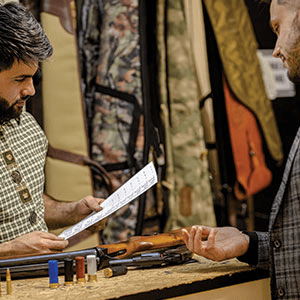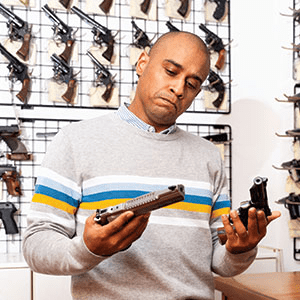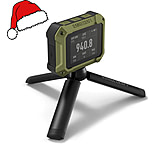Buying your first gun can be confusing, and you may not even know what you need to know before you go about the sometimes complex process.![]()
You’re not alone. The National Shooting Sports Foundation (NSSF) reported an estimated 8.4 million Americans bought their first firearm in 2020. (If you’ve already bought your first gun, you can skip ahead and read our New Gun Owner Tips). But in this article, I’ll try to help navigate you through the process and give you some tips on buying your first firearm.
My first shotgun, handgun, and rifles were all gifts from my dear ol’ Dad. My first time buying a gun was at the age of 21, and since then I’ve bought and sold many, many firearms on both sides of the gun counter. Even though by the time I bought my first gun, I’d owned them for 9 years and been shooting for 15 years, I was still worried that I’d slip up and make some rookie mistake that would make me look stupid.
The best thing you can be armed with before you walk into the gun shop is knowledge, although you’ll still have questions when you get there. This is all normal: nobody knows everything about anything, so don’t be afraid to let the clerk know right off the top that you’re buying your first gun.
Know Your Laws
First and foremost, make sure you’re up to speed on your gun laws. There are a lot of agencies involved, not just federal: they also include state, county, and even city regulations. As with any laws, they’re also subject to change.
A reputable gun store can help you understand these laws, and checking with your local law enforcement or consulting an attorney may be best if you have any doubts about your eligibility to own a firearm. This is especially important if you’re planning on buying your gun from another person in a private transfer. In some jurisdictions, this is no big deal, and in others, it’s a serious felony. If you do decide to go the private-sale route (where legal), it’s best to get the Driver’s License number from the seller and offer your own in return. This protects both of you if anything about the transfer is called into question at any future date.
 If you’re buying your first gun from a gun store, as most people do, here are some helpful tips that will make the legal part of the process easier for you:
If you’re buying your first gun from a gun store, as most people do, here are some helpful tips that will make the legal part of the process easier for you:
- Bring two forms of I.D. Many first-time customers have to return at a later time after they’ve retrieved their proper identification. Bring as many forms of valid, unexpired ID with a current address as you can, especially picture IDs. You probably won’t need most of it, but bring it anyway. I’ve been known to walk in with my Driver’s License, CCW Permit, Hunting License, Hunter’s Ed. card from 1989, Bowhunter’s Ed. card, Lifetime Hunting License Certificate, no-expiration ID card from college, and my vehicle registration out in the truck. Okay, I always carry all that ID, but nobody has ever questioned my identity when valid documents are requested.
- You’ll be required to fill out an ATF Form 4473 and submit to a background check at the time of purchase. These have historically been paper forms, but many retailers are switching to electronic forms that you fill out on the store’s computer. Although this may sound intimidating to you, it’s a normal course of business when selling guns. As a former clerk, I can tell you that they are not allowed to tell you what answers to provide, they can only clarify the questions themselves.
Bear in mind that it’s a felony to lie on a 4473, and any false or misleading answers you provide will probably be picked up on the background check. This check is done by the FBI through their NICS (National Instant Criminal Background Check System), and it’s very rare that anyone slips through the cracks. In that rare case that someone does slip through, they should expect Federal agents to be looking for them in the very near future.
Also, in case you think you’re beating the system by having someone else fill out the form for you, you’re not. That’s called a “straw purchase,” and it’s a felony punishable by up to 10 years in prison and a fine of up to $25,000 for the person who purchases the firearm. Having someone else do this for you means you are illegally obtaining a firearm, which is another crime unto itself, plus the crime of conspiracy to violate federal law. - These are the basic points on a 4473 outlining the federal laws that prohibit a person from purchasing or owning a firearm (as of May 2020), and your local jurisdiction may add additional questions:
- Anyone who is under indictment for a felony or any other crime that could imprison you for one year or more.
- Any felony conviction in a civilian or military court, or any other crime that could imprison you for one year or more.
- Any fugitive from justice.
- Any unlawful user of any controlled substance, including cannabis.
ATF Form 4473, Question 21.e., quote: “Warning: The use or possession of marijuana remains unlawful under Federal law regardless of whether it has been legalized or decriminalized for medicinal or recreational purposes in the state where you reside.” - Anyone adjudicated as mentally defective or who has ever been committed to a mental institution.
- Anyone discharged from the Armed Forces under dishonorable conditions.
- Anyone subject to a court order or Military Protection Order restraining them from harassing, stalking, or threatening an intimate partner, child, or child of an intimate partner.
- Anyone convicted in any court for misdemeanor domestic violence.
- Anyone who has renounced their United States citizenship.
- Any alien illegally or unlawfully in the United States.
- After you have filled out your 4473, the clerk will run your information through NICS. The sale will either be approved, denied, or delayed. No matter what the result, the clerk is not given any information as to why you may have been denied or delayed, and they have no control over the process. All they can do is provide you the contact information for the agency that denied or delayed the sale. Gun stores have laws they have to abide by in order to retain their FFL (Federal Firearms License), stay in business, and avoid criminal penalties. Throwing a fit, asking for a manager, or threatening to call your attorney will not change the outcome.
(Anyone who has ever worked behind a gun counter is currently nodding their head as they reminisce over the memories of such customers.)
Talk to Gun Owners That You Know
Having a casual chat with a gun owner you know can go a long way. They may have some strong opinions about what is and isn’t a good specific make and model of gun for your interests that might not turn out to be the best fit for you, but they can help you narrow down your options of the best model. Many will be happy to let you safely handle their gun and invite you to the shooting range (if so, offer to pay for the ammo and/or any range fees as a gesture of gratitude).
This allows you to test out the gun they probably think you should get for yourself, even if you decide to go in another direction. Gun folks tend to be pretty enthusiastic about sharing their interest and experience with friends and family who are interested in joining their ranks, so don’t be afraid to pipe up.
Online Articles & Videos
Yes, the internet is full of kooks and crackpots and people pushing all sorts of opinions, nonsense, and hearsay. It’s still a good resource to help you figure out what kind of gun is best for your needs. Sticking to reputable online sources is always a best practice, of course, but browsing reviews from other customers who’ve actually purchased the product can tell you a lot. I like to change the ranking of online reviews for the newest ratings first, then high to low, then low to high. I’ll read 5 or 10 of each to give me the most current opinions, the rave reviews from the folks who love it, and the scathing scorn of the highly dissatisfied. I’m not looking for anything in particular, I’m looking for trends. Does one particular thing keep popping up as a plus or a minus? Are there replies to the reviews from other owners agreeing, disagreeing, or offering helpful tips for any issues?
If you’re zeroing in on a certain model, don’t just stop at the manufacturer’s website. Online video reviews where you can see the gun in action are really helpful, and many of the people putting them out these days are impartial gun enthusiasts who genuinely want to share the knowledge. They may be a bit amateurish, but you can cut right through all of the sales pitches that you’ll get from someone trying to help you to part with your money.
Take A Class
Although it may initially seem odd to take a firearms course before you even own a gun, it’s a highly recommended first step. It’s very much like Driver’s Ed.: it’s not good to get behind the wheel if you’ve never driven a car and know little or nothing about what you’re doing. There are several different firearms courses that you can take to start building a good foundation for responsible gun ownership and are geared for people who are new to guns.
A basic introductory course for firearms is available in most areas, and any classes you find should clearly spell out the required prerequisites and experience levels prior to registration. If available in your area, a concealed carry permit class can be great but may not include any range time. That’s definitely something to check when you’re looking for instruction if you’ve never handled a firearm or if it’s been a long time since you did.
If you plan on getting a gun for hunting, Hunter’s Education is probably a legal requirement for a license in your state and will give the additional benefit of knowing whether or not hunting itself is an activity you’d enjoy. It’s a small upfront expense to take any of these kinds of classes, far less than you’ll spend on your first firearm, and well worth the time and money. In many cases, this will ease the process of your first gun purchase, since you have at least some level of documented training and familiarity with safe firearm practices (especially when it comes to concealed carry permit classes).
Even if you’ve already hit the range with a friend or family member, taking a class from a certified instructor is a good idea for any gun owner.
Shop Around
As a consumer of any goods, you have a choice of where to shop. Try to visit at least two or three different stores to check out their prices, inventory, and customer service. I’ve put this section under “Education” because the customer service part is really important. If a clerk is dismissive, treats you like an idiot, or outright ignores you, ask for another clerk or leave the store altogether. A good salesperson should ask questions, listen to you, offer several suggestions and options based on your needs, and be happy to answer any questions to help you make an educated choice. A bad one will try to hard-sell you one particular model, push their own opinions, and talk down to you if you seem inexperienced.
Ready to Go?
Now that I’ve covered most of the ins and outs of buying your first gun, I hope that you feel armed with the knowledge of the next best steps. Once you know the laws that pertain to you, from federal to local, you’ll be able to navigate the required paperwork. Taking that class, any applicable class, will build your confidence as you begin this journey. Getting as many differing opinions as you can will help you pare down a few choices to look at when you’re in the shop. As you get into shooting sports, you’ll find that you want or need more stuff to go along with your gun. When that time comes, check out everything OpticsPlanet has to offer!













